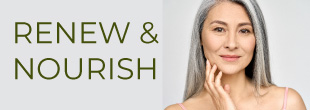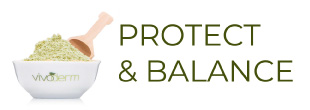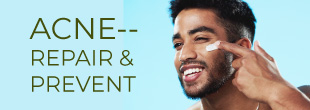Why Should I Look Out For Parabens and Sulfates? (Pt 1 of 2)
Many consumers today have spent vast amounts of money to improve their appearance. Cosmetic surgery and the topical skincare industry are multi-billion dollar businesses. It’s a simple law of economics that the higher the demand, the more skincare manufacturers will flood onto the marketplace. When demand for cheap, readily available products is high, quality ingredients tend to take a backseat over inferior, more accessible ones.

Many skincare products are unfortunately rushed to market to meet this demand without any real consideration to research and development. Most of the budget may go into the marketing of the product. On the surface everything looks great. The bottles and jars that the creams come in look appealing. The magazine advertisements are glossy, complete with a youthful looking model or a well known celebrity who may not even use the products themselves. But underneath the jar lid, one can typically find un-pronounceable ingredients chemically formulated to “imitate” their natural predecessor.
It seems incredible, but many skin care products are loaded with ingredients that actually harm your skin over time. Some of the more controversial preservatives used in recent years are called PARABENS.
WHY ARE PARABENS BAD?
According to Wikipedia, “Parabens are a class of chemicals widely used as preservatives in the cosmetic and pharmaceutical industries. Parabens are effective preservatives in many types of formulas. These compounds, and their salts, are used primarily for their bactericidal and fungicidal properties. They can be found in shampoos, commercial moisturizers, shaving gels, personal lubricants, topical/parenteral pharmaceuticals, spray tanning solution and toothpaste. They are also used as food additives.
Their efficacy as preservatives, in combination with their low cost, the long history of their use, and the inefficacy of natural alternatives like grapefruit seed extract (GSE),[1] probably explains why parabens are so commonplace. They are becoming increasingly controversial, however, because they have been found in extremely low concentrations in breast cancer tumors (an average of 20 nanograms/g of tissue). [2] Parabens have also displayed the ability to weakly mimic estrogen (a hormone known to play a role in the development of breast cancer).[2] No causal link between parabens and cancer has been established, however.[3]”
The US Environmental Protection Agency (EPA) in their report “Pharmaceuticals and Personal Care Products in the Environment: Agents of Subtle Change?” reported that the chemical preservatives called parabens—methyl, propyl, butyl and ethyl (alkyl-p-hydroxybenzoates)—displayed estrogenic activity in several tests.
This means that these chemicals mimic your body´s own hormones and can have endocrine-disrupting action when they are rubbed into your body or washed down the drain into your drinking water. These disruptors interfere with your body´s endocrine system: your hypothalamus, your ovaries, your thyroid—virtually every system in your body. The EPA also stated that “continual introduction of these benzoates (parabens) into sewage treatment systems and directly to recreational waters from the skin leads to the question of risk to aquatic organisms.” Scientists in Europe found other endocrine-disrupting body care chemicals in the bodies of fish that humans are eating, and in human breast milk.
Many organic and natural skincare practitioners claim organic herbal medicinal tinctures made from high quality organic herbs and organic grain alcohol are shelf-stable for around two to three years. These include foods considered by the FDA to be “self-preserving” and containing no preservatives, such as: honey, maple syrup, vinegar, olive oil, sugar, and wine.
According to one organic website, a self-preserved 100% organic moisturizing body oil made from organic sunflower oil, organic cocoa butter, organic coconut oil, organic peppermint oil and organic spearmint oil can have a shelf-life of up to 18 months. While this is HALF of its chemically-based brothers and sisters, some are finding those states to be more than palatable.
The Natural Skincare Authority lists, tea tree oil thyme essential oil, grapefruit seed extract, bitter orange extract among some of the alternatives to synthetic preservatives. Contrary to popular myth the decaying process is natural and happens with or without preservatives. In reality, preservatives serve only to delay the inevitable. Skin care products (just like food) do not and should not last forever. If left for long enough they will deteriorate and go rancid.
Simple actions like storing your natural/organic products and recipes in the refrigerator will help extend their shelf life (naturally). Taking the time to understand what you are buying and spreading on and through your skin can result in a healthier, happier, longer-lasting you.
1. a b von Woedtke T, Schluter B, Pflegel P, Lindequist U, Julich WD (1999 June). “Aspects of the antimicrobial efficacy of grapefruit seed extract and its relation to preservative substances contained”. Pharmazie (Greifswald, Germany: Institute of Pharmacy, Ernst Moritz Arndt University,) 54 (6): 452–6. PMID 10399191.
2. a b c d Harvey PW, Everett DJ (2004). “Significance of the detection of esters of p-hydroxybenzoic acid (parabens) in human breast tumours”. Journal of Applied Toxicology 24 (1): 1–4. doi:10.1002/jat.957. PMID 14745840.
3. Golden R, Gandy J, Vollmer G (2005). “A review of the endocrine activity of parabens and implications for potential risks to human health”. Critical Reviews in Toxicology 35 (5): 435–58. doi:10.1080/10408440490920104. PMID 16097138.
Tags: anti-acne skin, Natural Skincare, parabens, preservatives, skincare chemicals, sulfates, toxic skincare




